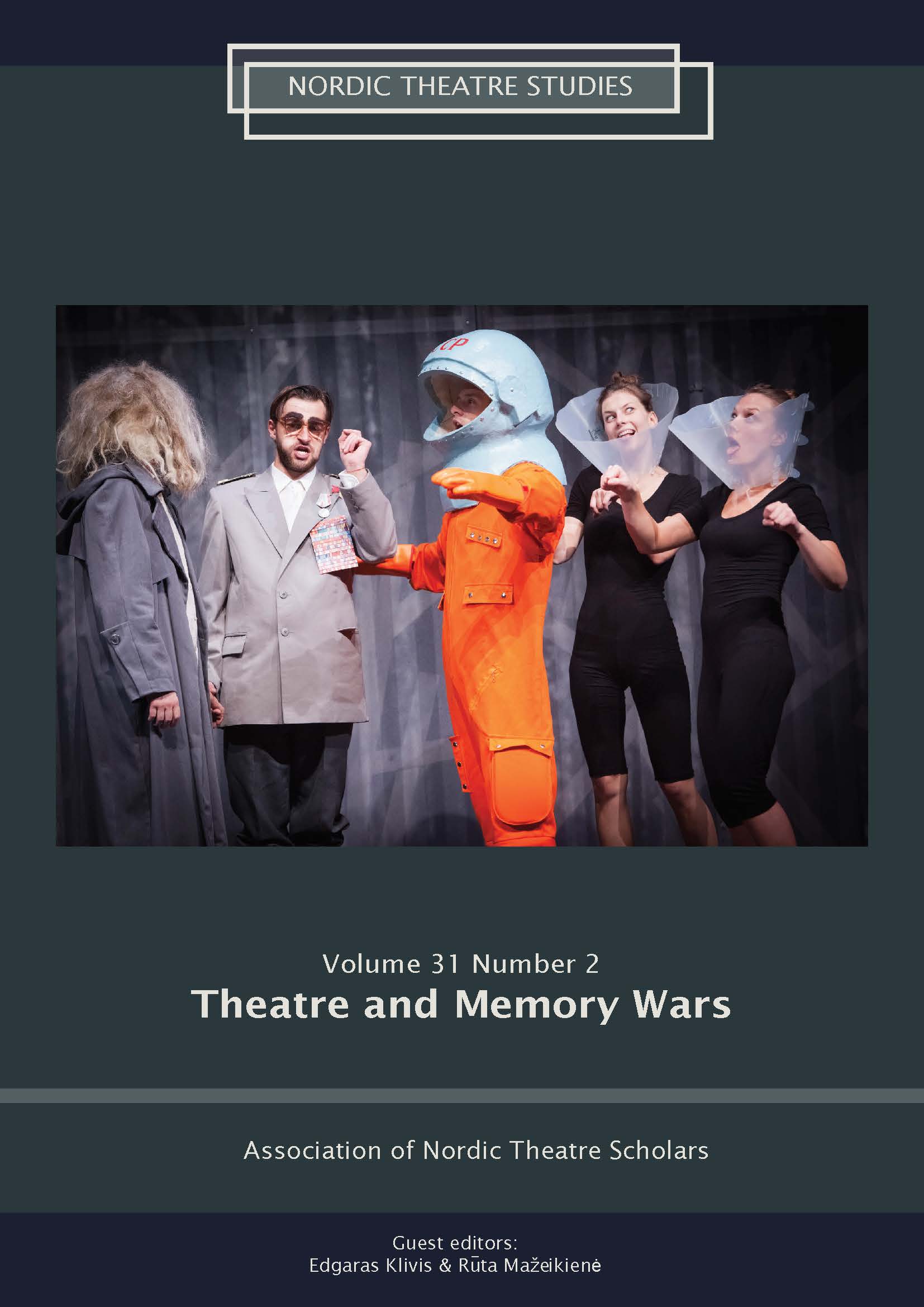Inventing the Past, Re-Writing the Present
The History and Memory on Contemporary Lithuanian Theatre Stage
DOI:
https://doi.org/10.7146/nts.v31i2.120121Keywords:
Autobiography, History, Lithuanian theatre, Memory, RepresentationAbstract
In recent years an increasing number of performances on the Baltic theatre stage attempt to escape the dominant understanding of “performing history” as a repetition or reinforcement of the monumental representations of the historical past or as a (re)production of “mythistory” (Joseph Mali). Lithuanian creators of performances about history increasingly choose hybrid approaches of representation, merging memorialization and critique, imagination and fact, documents and speculative inventions as forms of engagement with the past. This playful re-imagination of the historical past serves as a creative laboratory, where audience ability to recognize and/or resist historical manipulations as well as to embrace plural and polyphonic nature of memory are tested. In some cases, however, Lithuanian theatre creators are interested in “truthful” or “authentic” representations of personal memories, rather than a performative investigation of
mechanisms of production of the “reality effect” in historiography and their impact on audience perception. This article examines the ways in which historical events are represented on the contemporary Lithuanian theatre stage and, at the same time, addresses the larger issues around the implications of particular theatrical
stagings of the past on the current understanding of the subject of history.
References
Assmann, Aleida. 2010. Re-framing Memory. Between Individual and Collective Forms of Constructing the Past. In Karin Tilmans, et al. (eds.) Performing the Past: Memory, History, and Identity in Modern Europe. Amsterdam: Amsterdam University Press, 35-50.
Balodis, Jānis. 2015. „Meninė fikcija, tikresnė už istoriją“. Menufaktura. http://www.menufaktura.lt/?m=55337&s=66450#gsc.tab=0 (31.06.2018).
Carlson, Marvin. 2001. The Haunted Stage—Theatre as a Memory Machine. Michigan: University of Michigan Press.
Chanfrault-Duchet, Marie-Francoise. 1991. “Narrative Structures, Social Models and Symbolic Representations in the Life Story.” In S.B. Gluck, D. Patal (eds.). Women’s Words: The Feminist Practice of Oral History. London: Routledge, 77−92.
Cubitt, Geoffrey. 2007. History and Memory. Manchester: Manchester University Press.
DeGroot, Jerome. 2009. Consuming History: Historians and Heritage in Contemporary Popular Culture. London and New York: Routledge.
Deleuze, Gilles. 2008. Proust and Signs. London: Continuum.
Ekin, Paul John. 2008. Living Autobiographically. Cornell: Cornell University Press.
Erll, Astrid; Rigney, Ann. 2009. Introduction: Cultural Memory and its Dynamics. In Astrid Erll, Ann Rigney (eds.). Mediation, Remediation, and the Dynamics of Cultural Memory. Berlin: De Gruyter, 1-14.
Halbwachs, Maurice. 1992. On Collective Memory. Chicago: University of Chicago Press.
Heddon, Deidre. 2008. Autobiography and Performance. New York: Palgrave Macmillan.
Hutcheon, Linda. 1998. A Poetics of Postmodernism. New York and London: Routledge.
Karremann, Isabel. 2015. The Drama of Memory in Shakespeare’s History Plays, Cambridge: Cambridge University Press.
Le Roy, Frederik; Stalpaert, Christel; Verdoodt, Sofie. 2011. “Introduction to Performing Cultural Trauma in Theatre and Film.” Arcadia: International Journal of Literary Studies, 45:2, 249-263.
Mitchell, Kate. 2010. History and Cultural Memory in Neo-Victorian Fiction. London: Palgrave Macmillan.
O’Brien, Tim. 2014. “How to Tell a True War Story.” In Sebastian Faulkes, Jörg Hensgen (eds.) War Stories, London: Vintage Books, 309-315.
Postlewait, Thomas. 1989. “Autobiography and Theatre History.” In Thomas Postlewait, Bruce A. McConachie (eds.). Interpreting the Theatrical Past: Essays in the Historiography of Performance. Iowa: University of Iowa Press, 248-272.
Rokem, Freddie. 2000. Performing History. Theatrical Representation of the Past in Contemporary Theatre. Iowa: University of Iowa Press.
Silis, Valteris. 2015. „Teatras neturėtų teisti”. Menufaktura: http://www.menufaktura.lt/?m=1052&s=66405#gsc.tab=0 (31.06.2018).
Winter, Jay. 2010. “The Performance of the Past: Memory, History, Identity.” In Karin Tilmans, et al. (eds.). Performing the Past: Memory, History, and Identity in Modern Europe. Amsterdam: Amsterdam University Press, 11-34.
Downloads
Published
How to Cite
Issue
Section
License
The copyright belongs to the authors and Nordic Theatre Studies. Users can use, reuse and build upon the material published in the journal but only for non-commercial purposes. Users are allowed to link to the files, download the files, distribute the files on a local network (preferably by links), upload the files to local repositories if their institutions require them to do so, but not republish the files without proper agreements with the journal and the author.

